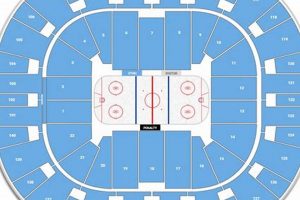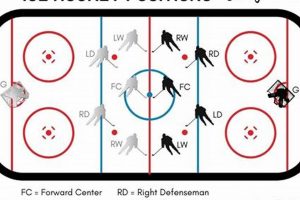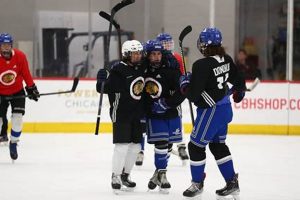A youth ice hockey organization based in Minot, North Dakota, provides opportunities for young athletes to develop their skills and passion for the sport. This organization typically fields teams across various age divisions, allowing players to progress from introductory levels to more competitive environments.
Participation in this organization fosters teamwork, discipline, and physical fitness among young people. Its presence contributes significantly to the local community by providing a positive outlet for youth activities and promoting a sense of civic pride. Historically, such organizations have played a vital role in developing talent that may eventually advance to higher levels of hockey.
The following sections will delve into specific aspects of this organization, including team structure, developmental programs, community involvement, and notable achievements, providing a detailed overview of its operation and impact.
Key Strategies for Success
The following recommendations are intended to provide guidance based on the principles exemplified by a prominent youth hockey organization in Minot, North Dakota. These strategies focus on player development, team cohesion, and community engagement.
Tip 1: Prioritize Skill Development: Emphasize fundamental skills such as skating, puck handling, and shooting through structured training programs. Consistent repetition and targeted drills are crucial for building a solid foundation. For example, dedicating a portion of each practice to skating technique drills can significantly improve players’ overall performance.
Tip 2: Foster Teamwork and Communication: Encourage players to work collaboratively and communicate effectively on and off the ice. Implement drills that require players to pass, support each other, and make coordinated plays. A team that communicates well can anticipate each other’s movements and execute strategies more effectively.
Tip 3: Promote Sportsmanship and Respect: Instill values of sportsmanship, respect for opponents, and adherence to the rules of the game. Coaches should model appropriate behavior and address any instances of unsportsmanlike conduct promptly. Creating a positive and respectful environment fosters personal growth and ethical development.
Tip 4: Encourage Physical Conditioning: Implement a comprehensive fitness program that focuses on strength, endurance, and agility. Regular physical activity enhances players’ performance, reduces the risk of injuries, and promotes overall health. Incorporating off-ice training sessions can complement on-ice practice and improve athletic capabilities.
Tip 5: Emphasize Tactical Awareness: Teach players to understand and apply tactical strategies, such as defensive positioning, offensive zone entries, and power play formations. Coaches should explain the rationale behind each strategy and provide opportunities for players to practice and refine their execution. Tactical awareness enables players to make informed decisions and adapt to different game situations.
Tip 6: Focus on Long-Term Development: Adopt a long-term perspective and prioritize player development over short-term wins. Coaches should create a supportive environment that encourages players to learn, grow, and reach their full potential. Emphasizing effort, improvement, and perseverance fosters a positive mindset and a lifelong love of the game.
These strategies, when implemented consistently, contribute to the success of any youth hockey organization by fostering skilled, disciplined, and well-rounded athletes. Prioritizing these elements will create a sustainable and thriving program for years to come.
The subsequent sections will explore the application of these principles within the context of community outreach and program sustainability.
1. Youth Development
The connection between youth development and participation in an ice hockey organization is multifaceted. It extends beyond athletic skill acquisition to encompass personal growth, social development, and the cultivation of important life skills. This relationship is crucial for understanding the broader impact of involvement in such programs.
- Skill Acquisition and Mastery
Structured training programs provide opportunities for young athletes to acquire and refine fundamental hockey skills. These programs involve progressive drills, personalized feedback, and consistent practice, fostering technical proficiency and tactical understanding. Mastering these skills not only improves on-ice performance but also instills a sense of accomplishment and self-efficacy.
- Teamwork and Collaboration
Participation necessitates collaborative effort, requiring athletes to work together toward shared goals. Team practices and games demand communication, cooperation, and mutual support. These experiences foster interpersonal skills, enhance conflict-resolution abilities, and promote a sense of belonging within a group dynamic.
- Discipline and Time Management
Balancing athletic commitments with academic responsibilities requires discipline and effective time management. Athletes learn to prioritize tasks, adhere to schedules, and manage their time efficiently to meet the demands of both school and hockey. These skills are transferable to other areas of life and contribute to overall academic and personal success.
- Character Development and Sportsmanship
Participation provides a platform for developing character traits such as resilience, integrity, and sportsmanship. Athletes learn to handle both success and failure with grace, to respect opponents and officials, and to adhere to the rules of the game. These experiences instill values that extend beyond the ice rink, shaping character and promoting ethical behavior.
These facets illustrate the holistic nature of youth development within the context of a hockey organization. They underscore the importance of providing young athletes with opportunities to grow not only as players but also as individuals, fostering skills and values that will serve them well throughout their lives.
2. Community Involvement
The relationship between the Minot Wolves hockey organization and the local community is a reciprocal one, characterized by mutual support and shared objectives. This engagement extends beyond the ice rink, influencing local culture, economy, and social cohesion.
- Volunteerism and Mentorship
A significant aspect of community involvement is the contribution of volunteers who dedicate their time and expertise to coaching, managing teams, and organizing events. These individuals often serve as mentors, guiding young athletes both on and off the ice. Their commitment reinforces the organization’s ties to the community and fosters a sense of shared responsibility for youth development.
- Fundraising and Sponsorship
The organization relies on fundraising efforts and sponsorships from local businesses and individuals to support its operations. These contributions enable the provision of equipment, ice time, and training programs for young players. In return, the organization offers visibility and recognition to its sponsors, creating a mutually beneficial partnership that strengthens local commerce.
- Community Events and Outreach
Participation in community events, such as parades, festivals, and charitable initiatives, enhances the organization’s visibility and fosters a sense of belonging. These activities provide opportunities for players and their families to interact with community members, promote hockey as a positive activity, and demonstrate the organization’s commitment to civic engagement.
- Economic Impact
The organization contributes to the local economy by attracting visitors to Minot for tournaments and games. These events generate revenue for local hotels, restaurants, and businesses, stimulating economic activity and supporting employment. This economic impact underscores the organization’s role as a community asset.
These facets demonstrate the integral role of community involvement in sustaining the Minot Wolves hockey organization. By fostering relationships with local residents, businesses, and organizations, the program ensures its long-term viability and its positive impact on the community as a whole.
3. Team Competition
Team competition constitutes a cornerstone of the organization’s structure and its function. This competitive environment, while fostering athletic development, simultaneously imparts crucial life skills. The organization offers various competitive levels, accommodating players of diverse ages and skill sets. These levels range from introductory leagues designed for skill development to more advanced leagues emphasizing strategic gameplay and high-performance execution.
The competitive experiences provided significantly impact the development of teamwork, discipline, and resilience among participants. Players learn to collaborate towards common goals, manage pressure under demanding circumstances, and adapt to evolving game situations. For example, participation in regional tournaments requires coordinated effort and strategic planning, fostering a deeper understanding of team dynamics and the importance of individual roles within the collective unit. Further, encountering both victories and defeats cultivates emotional intelligence and the ability to persevere through challenges.
In summary, team competition is not merely an aspect of the Minot Wolves hockey organization; it is integral to its mission of fostering well-rounded individuals. By providing structured competitive opportunities, the program cultivates athletic prowess and instills valuable life skills, shaping future leaders and contributors to the community. The challenges inherent in team competition also highlight areas for continuous improvement within the organization’s training methodologies and support systems.
4. Skill Enhancement
Skill enhancement is a core objective within the Minot Wolves hockey organization, integral to its mission of fostering athletic development. The organization designs training programs and resources to improve players’ capabilities, ensuring continuous progress and competitiveness.
- Fundamental Skill Development
This aspect emphasizes the acquisition and refinement of basic hockey skills, including skating, puck handling, shooting, and passing. Structured drills and repetitive practice sessions are used to build a strong foundation. For example, dedicated skating clinics focus on improving stride efficiency and agility, essential for players at all levels within the organization.
- Tactical Awareness and Strategic Execution
Beyond fundamental skills, players develop tactical awareness and strategic execution through game simulations and film analysis. Coaches instruct players on positioning, defensive strategies, and offensive plays, enabling them to make informed decisions during games. This includes studying opponent tendencies and adapting game plans accordingly, enhancing the team’s overall competitiveness.
- Physical Conditioning and Athletic Performance
The organization integrates physical conditioning programs to enhance players’ strength, endurance, and agility. These programs involve off-ice training sessions focused on improving cardiovascular fitness, building muscle strength, and increasing flexibility. Such conditioning minimizes the risk of injuries and maximizes athletic performance on the ice.
- Individualized Training and Skill Specialization
Recognizing that players possess varying skill sets and development needs, the organization provides individualized training and skill specialization. Coaches tailor training programs to address specific areas for improvement, such as power skating for defensemen or shooting accuracy for forwards. This personalized approach ensures that each player reaches their full potential within the team.
Skill enhancement, therefore, is a multifaceted endeavor within the Minot Wolves hockey organization. Through targeted training, strategic instruction, physical conditioning, and individualized support, the program aims to cultivate skilled, competitive, and well-rounded athletes. Continuous evaluation and adaptation of training methods ensure that players remain at the forefront of hockey development.
5. Sporting Values
The integration of sporting values within the Minot Wolves hockey organization forms the ethical and behavioral framework that guides its operations and influences its participants. These values, when consistently upheld, contribute to the development of well-rounded individuals and a positive organizational culture.
- Fair Play and Integrity
Fair play and integrity dictate adherence to the rules of the game, respect for opponents, and honest conduct on and off the ice. In the context of the Minot Wolves, this translates to players upholding ethical standards during games, coaches promoting integrity in decision-making, and officials ensuring equitable enforcement of regulations. Instances of cheating or unsportsmanlike behavior are addressed promptly to maintain a culture of fairness and honesty within the organization.
- Respect and Sportsmanship
Respect and sportsmanship involve treating opponents, teammates, coaches, and officials with courtesy and consideration, regardless of the outcome of a game. Minot Wolves players are expected to exhibit good sportsmanship by acknowledging opponents’ achievements, accepting losses gracefully, and refraining from taunting or disrespectful behavior. This includes maintaining composure during high-pressure situations and demonstrating respect for the authority of referees and linesmen.
- Discipline and Responsibility
Discipline and responsibility entail commitment to training, adherence to team rules, and accountability for individual actions. Minot Wolves players are expected to attend practices regularly, follow coaches’ instructions, and fulfill their responsibilities as team members. This also includes managing their time effectively to balance athletic commitments with academic pursuits and personal obligations. Players are held accountable for their behavior both on and off the ice, fostering a sense of personal responsibility and team cohesion.
- Teamwork and Collaboration
Teamwork and collaboration emphasize the importance of working together towards shared goals, supporting teammates, and valuing collective success over individual achievements. Minot Wolves players are encouraged to communicate effectively, cooperate on the ice, and prioritize team strategies. This includes assisting teammates in need, celebrating collective accomplishments, and understanding that individual contributions are integral to the overall success of the team.
These facets of sporting values collectively shape the organizational culture of the Minot Wolves, fostering an environment that promotes ethical conduct, personal growth, and community engagement. By prioritizing these values, the program aims to develop not only skilled hockey players but also responsible and respectful citizens, reinforcing its positive impact on the local community.
Frequently Asked Questions
The following section addresses common inquiries regarding the organization, participation, and operational aspects.
Question 1: What age groups are eligible to participate in the Minot Wolves hockey program?
The program offers opportunities for youth athletes across a range of age divisions, typically spanning from introductory levels for young children to competitive leagues for adolescents and young adults. Specific age eligibility criteria may vary from season to season and are outlined on the organization’s official website or in program registration materials.
Question 2: What is the cost associated with participation, and are there financial assistance options available?
Participation fees encompass expenses related to ice time, equipment, coaching, and administrative costs. The exact amount varies depending on the age division and program level. Financial assistance programs, including scholarships or payment plans, may be available for eligible families. Application procedures and eligibility requirements are detailed on the organization’s website.
Question 3: What level of prior hockey experience is required to join the program?
The program accommodates individuals with varying levels of prior hockey experience, from beginners to experienced players. Introductory programs are designed to teach fundamental skills to new participants, while more advanced leagues cater to players with established skill sets. Assessments may be conducted to ensure proper placement within appropriate skill groups.
Question 4: What equipment is required for participation, and is equipment rental or loan programs available?
Participants are required to have essential protective equipment, including a helmet, shoulder pads, elbow pads, gloves, hockey pants, shin guards, and skates. A mouth guard is also recommended for safety purposes. Equipment rental or loan programs may be available through the organization or local sporting goods stores to assist families in acquiring necessary gear.
Question 5: How are coaches selected and trained within the organization?
Coaches are selected based on their hockey experience, coaching qualifications, and demonstrated commitment to youth development. The organization may require coaches to undergo background checks and participate in coaching certification programs to ensure adherence to safety standards and best practices in player development.
Question 6: How does the organization address player safety and injury prevention?
Player safety is paramount within the organization. Coaches emphasize proper techniques to minimize the risk of injuries, and medical personnel are often present at games and practices. The organization may also provide educational resources on concussion awareness and injury prevention strategies for players and parents. Adherence to safety protocols and reporting procedures is strictly enforced.
Understanding these details provides a clearer picture of the program’s operational framework and commitment to providing a safe and developmental environment for young hockey players.
The following sections will delve deeper into specific aspects of player development and community engagement initiatives.
Conclusion
The preceding exploration has elucidated the multifaceted nature of the youth hockey organization in Minot, North Dakota. Key elements, including youth development, community involvement, team competition, skill enhancement, and the instillation of sporting values, collectively contribute to its function and impact.
Continued adherence to these principles will likely sustain the organization’s positive influence on young athletes and the broader community. Recognizing the integral role such programs play in fostering athletic prowess, personal growth, and community spirit remains paramount. The commitment to nurturing future generations of skilled, disciplined, and responsible citizens through sports underscores the organization’s enduring significance.


![Fun Bruins Hockey Coloring Pages: [Year] Designs! Your Ultimate Source for Hockey Updates, Training Guides, and Equipment Recommendations Fun Bruins Hockey Coloring Pages: [Year] Designs! | Your Ultimate Source for Hockey Updates, Training Guides, and Equipment Recommendations](https://ssachockey.com/wp-content/uploads/2026/01/th-707-300x200.jpg)




